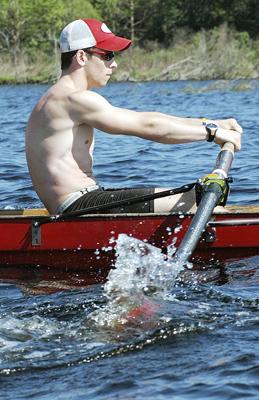As the early morning darkness still hangs over Lake Wheeler, N.C. State’s rowing team slides one or two of its boats into the water.
When the sun finally begins to rise and the fog hangs over the lake, the oars dip, turn, move forward and dip again with the constant, rhythmic splashing mixing with the calls from each boat’s coxen.
The rowing team is out on the lake at 6 a.m. again, practicing when the weather is best and the lake is at its quietest.
“It’s an amazing stress relief, especially when you’re out on the water by yourself,” Greg Mulholland, the club’s president and a senior in computer engineering, said. “You just feel the wind and the water, and you’re concentrating on one thing. And everything else just melts away while you’re out there.”
Because of this aspect of the sport, the club has grown in popularity. After dipping down in membership in the late ’90s, the club is as successful and large as ever.
In the fall, the Wolfpack finished first in the Head of the South, a competition of 30 teams held in Augusta, Ga., and took third in the Head of the Hooch, just behind Texas and Duke.
With the fall and spring separated into two different seasons, Mulholland said the club is still working on how to attack each semester.
“We typically do well in the fall and struggle more in the spring,” he said. “We’re still growing as far as spring training and finding out the best way to go about things. The fall and the spring are really two completely different seasons.”
The fall competitions consist of time trials, where each boat is on its own and timed for a specific distance. The spring season features a lane system, much like swimming, where the boats go head-to-head at the same time.
“In the spring, the races are swim-type races, with as close to a lane system as they can get,” Mulholland said. “There are hardly any true lane systems. Our lake has a slight bend to it.”
Most of State’s rowers got into rowing when they got to school and joined the club after they were told about it by other team members.
“I did cross country for a while, but I really missed the team aspect of sports,” Donald Katz, the club’s vice president and a senior in civil engineering, said. “I was invited out by a fellow student to do crew. Since there is no experience required I caught on fast, and by the end of that semester, I was the second-best on the team as far as time trial.”
Danny Heater, a freshman in industrial engineering, said one of the team members pulled him out of Carmichael Gymnasium and onto Lake Wheeler.
“I was using the rowing machines at Carmichael a lot, and one of the guys on the team asked me if I wanted to join the team,” Heater said. “Now I’m spending too much time rowing, but it’s better than playing video games all day.”
The ever-growing club has plenty of chances to get its members into action, with each race being broken down into one-, two-, four- or eight-person boats. But each boat adds to the problems of funding a rowing club.
“Our funding is on par with other clubs [at N.C. State]. We’re one of the better performing clubs as far as filing things in advance,” Mulholland said. “We need to fundraise more, and we’ve been hurt by the small teams of the late ’90s. We don’t have a real established alumni base, so we lack in funding from that area.”
Because of the lack of funding, the team rarely gets a new boat, especially compared to the Ivy League rowing powers, who according to Mulholland, get multiple new boats each year.
“We just bought a new one this year, but we usually only get new ones every five to 10 years,” Mulholland said.
Most boats are broken down by starboards and ports, which are the rowers, and one coxen, who is the master of strategy.
“The coxen is talking to the rowers the entire time, telling them when to push hard, when to take it easier, how much is left — everything,” Mulholland said. “You put complete faith in your coxen, and he can really win you the race.”
Mulholland once gave a speech to one of his public speaking classes, persuading the class to get involved with rowing. The speech was persuasive enough to grab another team member.
With each new recruit the team adds, Heater said the bond between the members becomes greater.
“I just love being out on the lake where it’s so peaceful,” he said. “You really form a bond with the other guys because you’re with them all the time, and they become your best friends out on that lake.”








